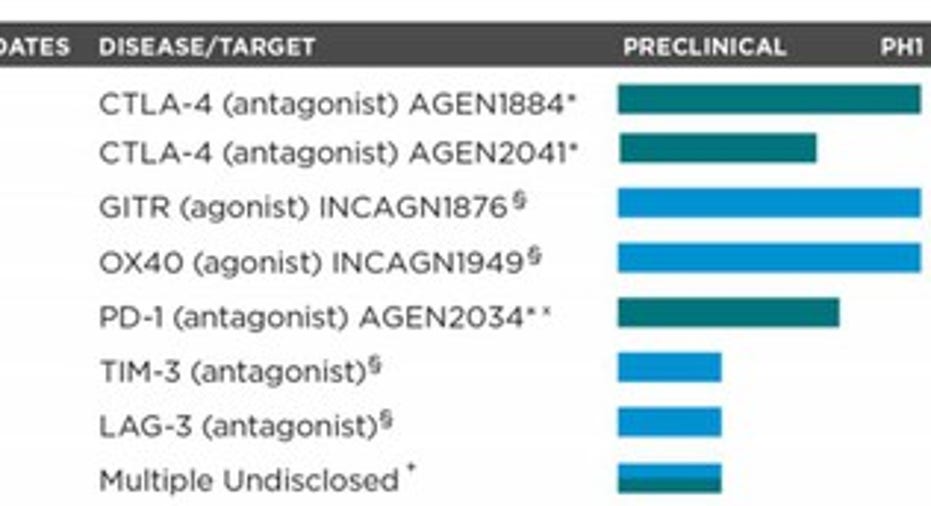Forget Celldex Therapeutics, Inc.: These 2 Stocks Are Better Buys

If ultra-high-risk, high-reward biotech stocks are your thing, thenCelldex Therapeutics (NASDAQ: CLDX) is probably on your radar right now. This beaten-down biotech stock, after all, could blast northward in a hurry if its experimentaltriple-negative breast cancer medicine,glembatumumab vedotin, hits the mark in its ongoing pivotal trial.
Image source: Getty Images.
Even so, Celldex's upside potential actually pales in comparison to other downtrodden cancer specialists like Agenus (NASDAQ: AGEN) and Geron Corp.(NASDAQ: GERN). Let's dig deeper to find out why.
Agenus' paltry market cap is at odds with its broad immuno-oncology pipeline
Agenus is a small-cap biotech that's developing both vaccines and biologic drugs aimed at treating cancer. While the recent regulatory filing of its shingles vaccine candidate -- which is being co-developed withGlaxoSmithKline-- is certainly an important value-driver in its own right, the real prize, at least from a commercial standpoint, is undoubtedly the company's broad anti-cancer pipeline composed mostly of checkpoint antibodies.
The backstory is that the breakout successes of Bristol-Myers Squibb's and Merck's checkpoint inhibitors, Opdivo and Keytruda, respectively, have essentially triggered an arms race within the pharma industry over the last few years. As a result, most major biopharmas now have their own checkpoint antibodies in development with the goal of carving out a profitable niche within the high-growth immuno-oncology (I-O) landscape.
Agenus, for its part, is rather unique in this regard because it's among the few small-cap companies that decided to dive headfirst into the checkpoint inhibitor space, despite the stiff competition from nearly every big pharma at this point.
The good news is that Agenus' I-O pipeline was compelling enough to attract the interest of both Merck and Incyte, with both of these bigger names agreeing to sign licensing deals with the biotech to develop anti-cancer checkpoint antibodies.
Most importantly, though, these collaborations, along with Agenus' own internal efforts, have already led to the successful launch of three Phase 1 trials and a number of pre-clinical studies, inching the company closer to the all-important goal of becoming a cash-flow-positive entity:
Image source: Agenus Investor Presentation.
Keeping with this theme, Agenus appears to be about three to four years from a possible regulatory filing based on the typical developmental time frame required for checkpoint inhibitors in general. Granted, the market could be near its saturation point by then, but Agenus doesn't exactly need a blockbuster I-O product to create enormous value for its shareholders.
After all, the biotech's present market cap of $356 million implies that even a so-called "me too" medicine, or a drug that isn't well-differentiated from its peers in terms of efficacy or safety, would still be a major win for its shareholders.
What's most intriguing about checkpoint inhibitors is that they have already proven themselves to be unusually powerful anti-cancer agents, and they have more often than not hit the mark in clinical trials. So this tiny biotech seems to have a better-than-average chance of actually transforming into a full-fledged cancer drugmaker within a few short years, giving it a favorable risk-to-reward profile.
The fate of Geron's first-in-class telomerase inhibitor could soon be clear
Geron's stock has basically been in a holding pattern ever since the first internal data reviews of its blood cancer drug, imetelstat, were conducted by the biotech's partner, Johnson & Johnson (NYSE: JNJ), last September.
The basic story is that Johnson & Johnson, through its biotech subsidiary Janssen, is presently assessing imetelstat's ability to generate disease-modifying responses in patients with myelofibrosis (MF) andmyelodysplastic syndromes (MDS) -- two rare but deadly types of hematological malignancies. Unfortunately, the drug's ongoing trials for these initial indications have yet to produce the kind of breakout results investors and patients were hoping for following the promising pilot studies that initially sparked J&J's interest.
In fact, imetelstat's mid-stagemyelofibrosis study appears to be hanging on by a thread at this point after the lower-dose arm failed to produce a compelling efficacy signal, and the higher-dose arm was closed to new patient enrollment thanks to an insufficient number of patients meeting the protocol-defined interim criteria at 12 weeks.
While neither J&J nor Geron has provided much in the way of details about imetelstat's ongoing clinical trials, the companies have outlined imetelstat's projected developmental pathway moving forward.
The short version is that Janssen is scheduled to perform a second internal data review for both studies in the second quarter of 2017. And this upcoming data review should be the pivotal event that determines whether J&J will sally forth with imetelstat's clinical program or terminate its partnership with Geron altogether. If J&J hits the eject button, then Geron's stock will almost certainly collapse, as the company has no other clinical assets.
The bright side is that blood cancer drugs -- even minor ones -- fetch ginormous premiums in buyout scenarios. Moreover, J&J will likely take Geron off the market immediately if imetelstat starts to look like a viable drug candidate, especially after losing its bid to acquire the remaining commercial rights to Imbruvica.
In all, Geron's risk profile is not for the faint of heart, but it could also garner a jaw-dropping premium as J&J's next oncology acquisition -- or, alternatively, generate outstanding gains for investors as a stand-alone cancer specialist, depending on imetelstat's clinical progress.
10 stocks we like better than Geron When investing geniuses David and Tom Gardner have a stock tip, it can pay to listen. After all, the newsletter they have run for over a decade, Motley Fool Stock Advisor, has tripled the market.*
David and Tom just revealed what they believe are the 10 best stocks for investors to buy right now...and Geron wasn't one of them! That's right -- they think these 10 stocks are even better buys.
Click here to learn about these picks!
*Stock Advisor returns as of January 4, 2017.
George Budwell has no position in any stocks mentioned. The Motley Fool recommends Celldex Therapeutics and Johnson and Johnson. The Motley Fool has a disclosure policy.



















